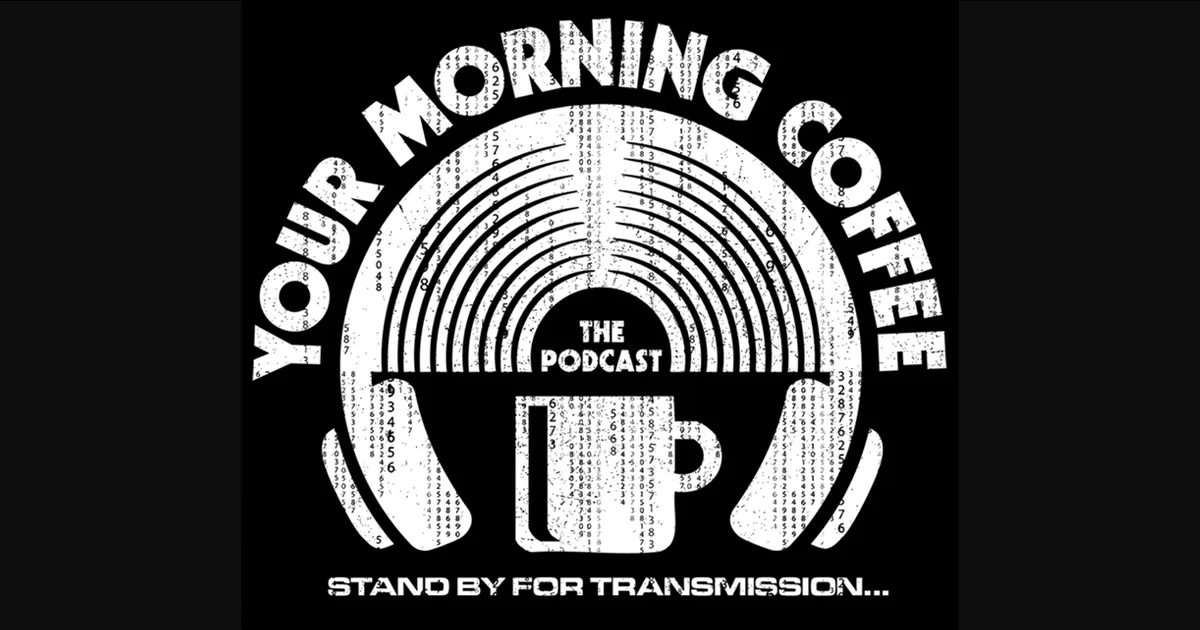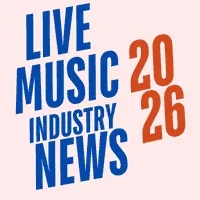In this interview, Andre Calilhanna of the Disc Makers Blog sat down to chat with Ariel Hyatt, founder of Cyber PR and recent author of The Ultimate Guide To Music Publicity on what it takes to get great PR for your music.
Guest post by Andre Calilhanna of the Disc Makers Blog
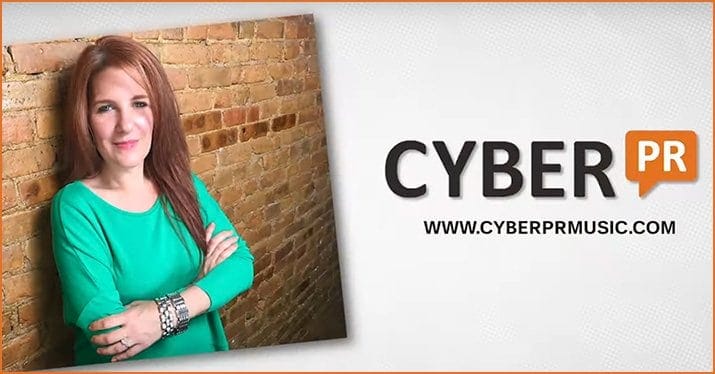
Disc Makers Blog manager, Andre Calilhanna, sits down for a Zoom interview with Ariel Hyatt, founder of Cyber PR and author of the new book, The Ultimate Guide To Music Publicity.
Andre Calilhanna: So, I started reading your book and the first question I had seems to be the same question you had when you entered into this field, which is, “What is PR?”
Ariel Hyatt: The definition of PR has changed pretty dramatically in the 25 years since I dove in. PR used to mean the relationship between a person and all of the journalists out there. A publicist was the access point.
But now PR has become so many other things because we have social media. Publicists are very valuable and you can use them in your career, but the truth is PR is now any communication that goes from you out into the world, because now anything can result in “tastemaker PR.” If someone shares music that you created on their Instagram story, that’s a form of PR. So, I like to define PR as anything that is communication from you going out into the world that’s public-facing.
Andre: That’s interesting, because I always thought there was a distinct difference between public relations (PR) and marketing. Are you saying that’s blending a bit now? Is there less of a distinction?
Ariel: I think there is a little bit less of a distinction. If you’re going to talk about PR meaning someone who is a tastemaker — a blogger, playlister, podcaster, journalist, etc. — the thing that’s fascinating about PR in today’s world is you can pretty much get to all of those people on Twitter, Facebook, Instagram, and LinkedIn. That, of course, was not the case 25 years ago because the Internet didn’t exist.
Creating the perfect pitch
Andre: One of the first things we ever posted on the Disc Makers Blog was from you about writing and creating the “creating the perfect pitch.” And for everything that has changed over the last 25 years, that seems like one of the things that hasn’t changed — the need for having a defined pitch. I wondered if you thought the same and how important those elevator pitches are.
Ariel: They’re so important and it’s really interesting, because artists who have nailed a really strong elevator pitch/15-second pitch, those are the ones who can successfully articulate who they are in a way that is so crucial and important.
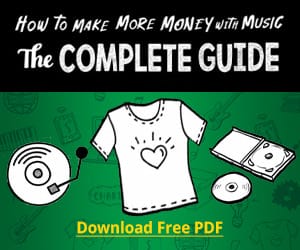
If you’re at a party, if you’re meeting a booking agent, if you’re anywhere and someone asks, “What does your band sound like?” or “What does your music sound like?” you have a succinct answer that gives the person a very clear sense of what your music sounds like. If you can do that, you are leaps and bounds ahead of the artist who says, “Well, we’re kind of rocky, poppy, jazzy salsa.” You can’t confuse people with too many genres or too many comparisons. People need something that is concise — and it will also help you define your brand.
And there’s a strange phenomenon going on in the business — and it’s in social media too: choose three fun words and an emoji. Well, you can’t choose three fun words and an emoji when you’re talking to someone, so there is a distinction between something cool that you might post on Instagram versus how you define yourself in a 15-second pitch.
And I find it kind of annoying when I’m researching bands or a band wants to work with us — if you find four or five witty words that don’t actually describe what the music sounds like or what musical bucket to put you in, it’s going to be hard for members of the media to understand what you’re all about.
You have to have a story
Andre: Ideally, what does a band have to have together when they come to you for them to have success with whatever it is they’re hiring you to do?
Ariel: You have to have a story. Four dudes meeting in college coming together and forming a band is not a memorable story. So the first thing you want to think through is, “What is your hook?” And a hook doesn’t have to be a huge, dramatic thing, like if you watch The Voice or American Idol, the hook is often something that has you sitting on your couch crying… they survived cancer, there was a divorce, their house burned down in a fire and now they sing — you don’t have to go in that direction.
A hook just has to be something that people walk away from you remembering. So you want to have a bio with that moment, that hook. You also want to have great music that is well-thought-out, well-produced, mastered; you want to have a release schedule of some sort, you can work with your publicist to figure out the best times to release your music. Don’t come to someone in the industry with a pre-set schedule because that may not work with what they’re doing.
You also want to have really good visuals, photos — and multiple photos — because in today’s social media world, the same press shot used over and over is going to be tired very quickly. And then you want to have a brand that’s shored up. So aside from the moment, the hook — the signature story — what is your brand portraying online on your socials? Are you funny? Are you witty? Are you political? Are you direct? Are you mysterious? Whatever it is, that should carry across your social channels and make very clear to anyone who is trying to understand who you are.
Be flexible with your music PR
Andre: I’m assuming a PR campaign is going to be promoting something specific — a tour, an album, a single — right? I’m not just coming to you because I have a band and I want people to know about me. I should have something I want to be promoting, correct?
Ariel: Correct, and especially now, in a singles-based world, you want to have some singles coming out, not just, “here’s 12 tracks dropping.” That’s really hard to publicize.
Andre: Let’s say I have 12 songs. I’ve got an album’s worth of material, should I come to you and say, “How do I make the most of this with a release schedule, dropping a single every three or four weeks, for the first three or four singles?” How much should I have planned in advance and how much do I rely on you to tell me how to get the most mileage out of it?
Ariel: That’s a hard question to answer because there’s no hard and set rule for what to do. Yes, you absolutely want to be consulting with your publicist or anyone you’re hiring. You don’t want to come to them and say, “here’s what we’re doing,” because you’re coming to them for their expertise. But yes, one strategy certainly can be you have 12 tracks and you release one every three to four weeks. That is obviously a year-long endeavor and you probably won’t be hiring a publicist for a year because that can get expensive, so you might want to work with them and say, “which three tracks do you think are the strongest and will work best with your contacts?
Let the publicist give you the reasons why they think those three tracks are the best and what their plan would be for those tracks. Then, after you get their feedback, you can say, “I’m going to release four tracks, then the PR will start, then we’ll do three tracks together, then I’ll do three more tracks after. That could be one way to go. But’s it’s really important to be malleable. Because, sometimes you can release a track with the plan to have something dropped every three to four weeks, and a track just bricks — or what if something is a smashing success and it’s blowing up on Spotify and it’s being picked up on media? You don’t want to truncate that marketing time if you can get a few more weeks out of it. So being flexible with your PR is smart.
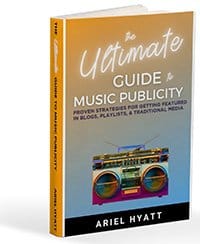
Part 2 of the interview is coming soon, but you can get Ariel’s new book, The Ultimate Guide to Music Publicity: Proven Strategies For Getting Featured In Blogs, Playlists, & Traditional Media, right now to learn everything you need to know about music PR.
Get your eBook eBook directly from Ariel (Disc Makers readers get $2 off) or purchase your print copy on Amazon.


